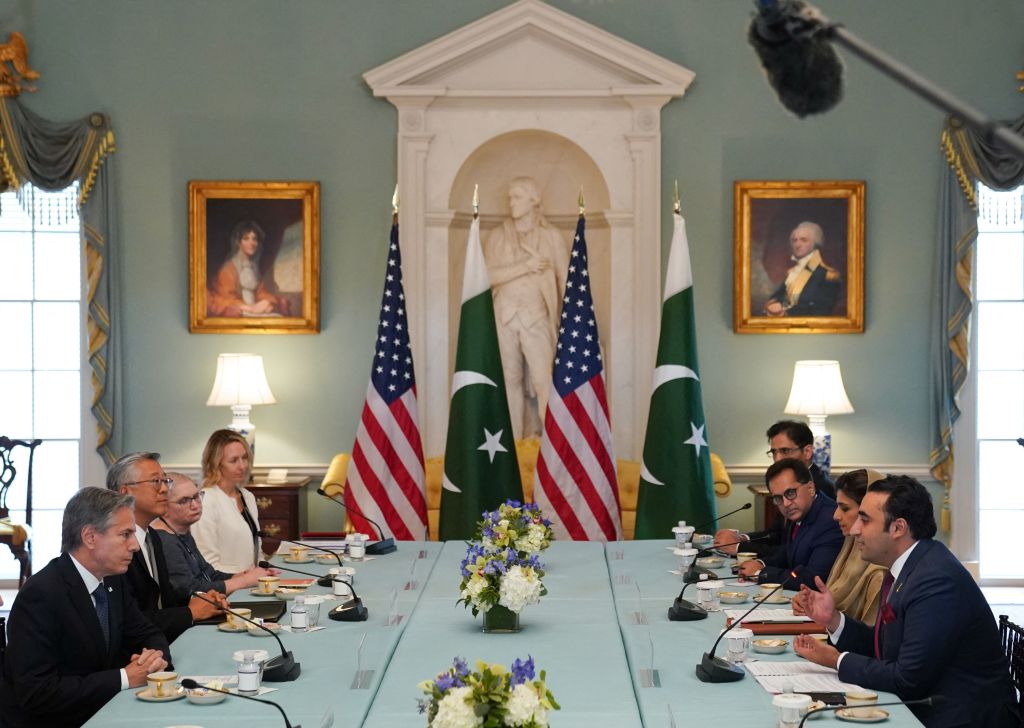
Climate Change Relief Can Transform the Pakistan-U.S. Relationship
A series of devastating floods between June and October have put enormous pressure on Islamabad. An estimated 5.7 million flood victims are set to face an intensifying food crisis, as the scale of Pakistan’s torrential downpours stretches to major agriculture belts. This deals a blow to steady long-term food supplies and risks sudden shortages if future flooding persists. Pakistan’s modest economic profile also challenges prospects of food imports from neighboring countries, while relief agencies face an uphill battle accommodating flood victims in submerged cities.
For decades, the Pakistan-U.S. relationship has put a premium on counterterrorism priorities in Afghanistan, but a steady decline in security cooperation makes it critical to generate new common ground for long-term engagement. The United States should reorient its relationship with Pakistan toward collaboration over climate change. By prioritizing long-term disaster relief and debt swap guarantees for Pakistan, U.S. policymakers can open avenues for a more productive relationship, effectively address anti-Americanism, and deliver on Washington’s own commitments to climate action in the developing world.
Pakistan’s Substantial Challenge
Pakistan is among the world’s most vulnerable countries to climate change. Despite contributing only 0.8% to global carbon output, it continues to pay the cost of extreme weather changes driven by emissions from top polluters. As early as 2018, a COP24 special report found that across the past 40 years, over 90% of natural disasters affecting Pakistan have been triggered by climate change. Flood-hit Pakistan’s geographical proximity to other climate vulnerable nations in South Asia also strengthens the possibility of similar monsoon dangers in the region. It shows in the higher-than-average warming of the Arabian Sea – a key contributor to Pakistan’s devastating rains. Out of nearly 1,740 flood-induced deaths in Pakistan, women and children constitute the majority.
To prevent the spillover of flood-borne diseases to other provinces, Pakistan must rebuild its fragile health care infrastructure, but hundreds of damaged health facilities could take years to restore, let alone improve. The country’s increased exposure to global emissions and extreme temperatures is also a warning sign for India and Afghanistan, which may also soon face the devastating effects of climate change. Over $30 billion in estimated flood losses have put more distance between Pakistan and its progress on the U.N. Sustainable Development Agenda, despite improving its ranking.
The deadly aftermath of Pakistan’s flooding has attracted global attention, but concrete action is necessary to retain global focus. The United Nations has already upped its flood aid appeal to $816 million, warning of a “second wave of death and destruction” as health cases and nutrition risks add up for vulnerable populations. Frequent changes in government have increased political uncertainty, making it difficult for Pakistan’s ruling coalition to sustain long-term rule and adding to the difficulty of maintaining spending oversight and rebuilding health infrastructure at the provincial level.
Cases of water-borne and vector diseases are likely to sharply increase in the absence of an enduring humanitarian commitment to bolster government relief efforts. According to the U.N.’s resident and humanitarian coordinator in Pakistan, over 1,700 health facilities and hospitals have either been destroyed or damaged, and over a million Pakistanis would slide into hunger without rapid international support. Pakistan has invested significant energy in its global diplomacy efforts, giving outsized importance to collective climate action and substantial debt relief in talks at the United Nations and through engagements with key developed countries.
Democratization and Migration Policy
Islamabad’s modest economic profile necessitates some dependence on international loans for domestic stability. The International Monetary Fund (IMF) continues to provide vital support for Pakistan’s post-flood reconstruction efforts, and engagement with its program remains critical to support a heightened sense of macroeconomic stability in the country. But tough government decisions on cutting fuel and energy subsidies have drawn the public’s ire in the past, bringing Pakistan’s balancing act under scrutiny as it attempts to meet stringent IMF conditions without sacrificing much-needed economic relief for the masses.
Pakistan’s exports are unlikely to score big gains as major crops such as cotton incur heavy damage from the floods. A third of the country’s cotton crop has been adversely impacted, while a protracted health and food crisis threatens to take its toll on flood victims in hard-hit provinces.
Pakistan’s limited success in securing debt-for-climate swap guarantees – debt relief in return for binding climate financing commitments – is also hampering the country’s spending potential. By using its flood devastation as a case in point, the United States and major international bodies can emerge better positioned to advocate for debt swap arrangements that support Pakistan and other highly vulnerable, low-to-middle income economies. That consensus is vital to drive collective progress on climate financing by the end of this decade.
Historically, Washington and other Western partners have played a key role in advancing Pakistan’s emergency relief efforts. For instance, swift aid packages – including through the U.S. Agency for International Development (USAID) – identify closely with past humanitarian and disaster assistance support. But consistent aid risks falling short of impact unless Pakistan’s economy is given adequate space to facilitate future stimulus. Several disease outbreaks and an escalating food crisis are pushing Pakistan’s flood recovery spending to the limit. It shows in Climate Minister Sherry Rehman’s remarks at an aid conference in Geneva recently, warning that Pakistan was out of flood recovery money.
A Shift in Pakistan-U.S. Ties
The emergence of climate change as a top policy priority in Islamabad could lead to a change in expectations in its relationship with the U.S. Early signs include a September visit by Pakistani Foreign Minister Bilawal Bhutto Zardari to Washington, where he pressed U.S. officials to lead the global climate response. In a clear message to the U.S., Bhutto Zardari urged Washington to make his country “the pilot case” for meeting U.S. climate commitments of the past.
The United States can play a meaningful role by scaling up partnerships with the Pakistani government on food, nutrition, water, and long-term shelter assistance in flood-hit areas. In a sign that the U.S. is open to a reoriented relationship with Islamabad, State Department Counsellor Derek Chollet recently mirrored Bhutto Zardari’s stance on deeper climate cooperation, discussing the “profound crisis” of Pakistan’s floods and how it represents “a new opportunity” for improved bilateral ties.
Unlike Pakistan’s climate challenges, U.S.-Pakistan security cooperation is low on the agenda for both countries. Since the U.S. withdrawal from Afghanistan, the relationship has lacked an enduring commitment that could bridge trust deficits and ensure a lasting diplomatic reset. There is a strong chance that a climate-oriented reset will plug that gap.
Any long-term climate and disaster relief support to Pakistan will be seen as valuable evidence that the U.S. is prioritizing millions of Pakistanis and their livelihoods. Past successes in the counterterrorism space have carried limited long-term promise for the Pakistani people and reinforced fears of a transactional relationship. The U.S. war in Afghanistan killed nearly 70,000 in Pakistan and cost over $120 billion in economic losses. Washington’s withdrawal has also prompted increased cross-border militant attacks against the Pakistani state, empowered terrorist groups, and left Taliban militants undiminished.
Despite Islamabad’s outsized support for the U.S.-led war in Afghanistan, including its facilitation of refugees and delicate U.S.-Taliban negotiations, there was no mention of Pakistan in the Biden administration’s national security policy. It is in the interests of both countries to give productive climate cooperation prospects due recognition.
The absence of meaningful cooperation risks strengthening anti-Americanism in Pakistan’s opposition politics, with ousted Prime Minister Imran Khan questioning the reliability of Pakistan-U.S. ties through mass protests and public rallies. A deteriorating U.S.-Pakistan relationship could bring further instability to South Asia, challenge U.S-Pakistan climate engagements, increase food and economic insecurity in Pakistan, and intensify anti-U.S. sentiment in domestic politics. That is an outcome undesirable to Washington.
By giving Pakistan’s post-flood reconstruction needs due recognition at the G-20, G-7, United Nations, and IMF, Washington is better positioned to deliver on its own goals: to advance long-term debt relief, and sustainable action to economies in need. That scenario is foreseeable: Experts and officials on both sides have illuminated ways for this consequential relationship to diversify toward a more meaningful and mutually considered climate agenda.
Taken together, strong support for global climate action in Washington strikes a natural parallel with Pakistan’s push for more climate-driven cooperation with the U.S. An enduring U.S. climate commitment could resonate with the Pakistani people in the long term – an outcome that counterterrorism cooperation struggled to achieve.
The views expressed in this article are those of the author and not an official policy or position of the New Lines Institute.




